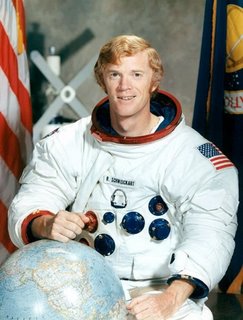 Russell Schweickart was born in New Jersey, 1935 but he became famous as an American astronaut. Following his orbiting of the earth for ten days in March 1969 he wrote this article that invites people to see the world as a whole.
Russell Schweickart was born in New Jersey, 1935 but he became famous as an American astronaut. Following his orbiting of the earth for ten days in March 1969 he wrote this article that invites people to see the world as a whole.BUT UP THERE you go around every hour and a half, time after time after time. You wake up usually in the mornings, over the Middle East and over North Africa. As you eat breakfast you look out the window and there's the Mediterranean area, Greece and Rome and North Africa and the Sinai, that whole area. And you realize that in one glance what you're seeing is what was the whole history of humankind for years - the cradle of civilization.
And you go down across North Africa and out over the Indian Ocean and you look up at that great subcontinent of India pointed down toward you as you go past it, Ceylon off to the side, then Burma, Southeast Asia, out over the Philippines and up across that monstrous Pacific Ocean, that vast body of water - you've never realized how big that is before. And you finally come up across the coast of California, and you look for those friendly things, Los Angeles and Phoenix, and on across to El Paso. And there's Houston, there's home, you know, and you look out, and you identify with it.... And you go out across the Atlantic Ocean and back across Africa, and you do it again and again and again... And it all becomes friendly to you.
And you identify with Houston and then you identify with Los Angeles and Phoenix and New Orleans. And the next thing you recognize in yourself is that you're identifying with North Africa. You look forward to it, you anticipate it, and there it is. And that whole process of what it is you identify with begins to shift. When you go around the Earth in an hour and half, you begin to recognize that your identity is with the whole thing. And that makes a change.
You look down there and you can't imagine how many borders and boundaries you cross, again and again and again, and you don't even see them. There you are - hundreds of people in the Middle East killing each other over some imaginary line that you're not even aware of, that you can't see. And from where you see it, the thing is a whole, the earth is a whole, and it's so beautiful. You wish you could take a person in each hand, one from each side in the various conflicts, and say, "Look. Look at it from this perspective. Look at that. What's important?"
Source: Russell Schweickart, No Frames No Boundaries, Rediscovering the North American Vision, Summer, 1983, Context Institute.
Image: Russell Schweickart

